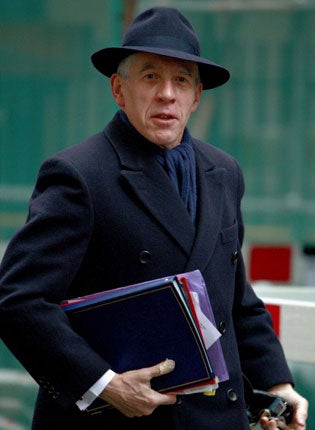Straw forced into retreat over ‘Big Brother’ data sharing plan
Justice Secretary seeks to allay fears of a drift towards a ‘surveillance society’

Your support helps us to tell the story
From reproductive rights to climate change to Big Tech, The Independent is on the ground when the story is developing. Whether it's investigating the financials of Elon Musk's pro-Trump PAC or producing our latest documentary, 'The A Word', which shines a light on the American women fighting for reproductive rights, we know how important it is to parse out the facts from the messaging.
At such a critical moment in US history, we need reporters on the ground. Your donation allows us to keep sending journalists to speak to both sides of the story.
The Independent is trusted by Americans across the entire political spectrum. And unlike many other quality news outlets, we choose not to lock Americans out of our reporting and analysis with paywalls. We believe quality journalism should be available to everyone, paid for by those who can afford it.
Your support makes all the difference.The Justice Secretary, Jack Straw, will make a U-turn over sweeping new powers which were to allow public bodies to swap the data they hold on individuals.
In a clear sign the Government is worried about growing criticism that it is creating a “Big Brother Britain”, Mr Straw is to rewrite his Coroners and Justice Bill to build in new safeguards to protect the public. He will table several amendments to the measure when it reaches its report stage in the Commons next month.
The climbdown comes after MPs from all parties and civil liberties groups warned that the Bill would mark a major departure from the principle that information collected for one purpose by the Government should not be used for another.
Critics are worried that the measure would pave the way for data sharing to be extended in future without fresh legislation. They claim that ministers would be able to approve public bodies handing over sensitive information to companies. Allies of Mr Straw revealed last night that he now accepts the provisions in the Bill were too broad. They said he has asked officials to draw up plans to tighten the provisions in an attempt to allay fears about a drift towards a “surveillance society”, and thus win public confidence in the measure.
However, the Justice Secretary insists that there is still a case for more data sharing to improve public services. For example, a Department of Work and Pensions project will ease the distress of bereaved families by ensuring they have to report a death to the authorities only once. Another scheme will allow families who qualify for free school meals to get help towards the cost of home computers to access government services, without providing documentary evidence about their incomes.
David Blunkett, who is regarded as a hardliner by civil liberties groups after introducing identity cards as Home Secretary, has lobbied Mr Straw to water down his Bill. He is particularly worried about a proposal allowing ministers to make “information-sharing orders” enabling “any person” to share information which includes personal data.
In a speech today, Mr Blunkett will warn that data sharing is a “major area of public concern”. The former cabinet minister will say: “It is not simply whether the intentions are benign – undoubtedly they are – but whether they are likely to be misused and above all what value their use may have.”
Campaign groups welcomed Mr Blunkett as an unlikely recruit into their ranks yesterday. But they warned that his proposal for the Government to replace plans for compulsory ID cards with proposals to force British people to hold passports would not overcome their objections.
Join our commenting forum
Join thought-provoking conversations, follow other Independent readers and see their replies
Comments